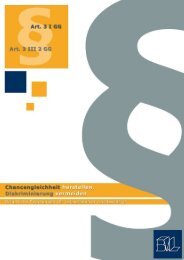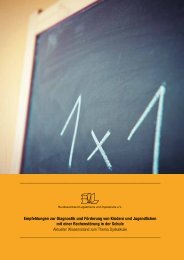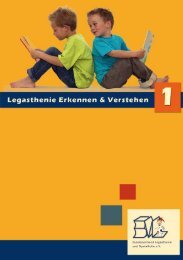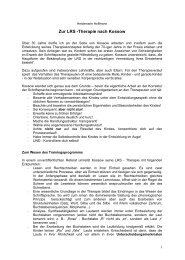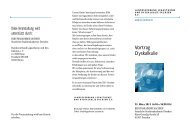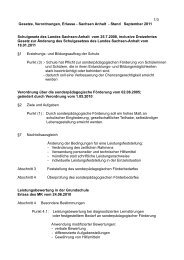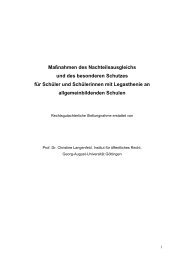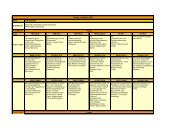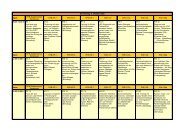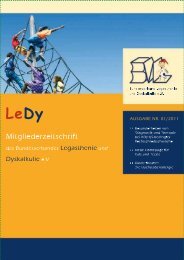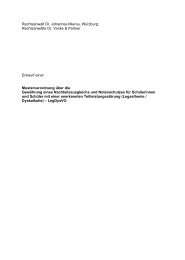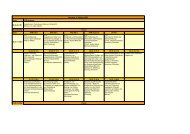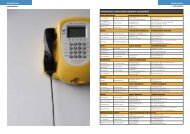Testverfah - Bundesverband Legasthenie und Dyskalkulie eV
Testverfah - Bundesverband Legasthenie und Dyskalkulie eV
Testverfah - Bundesverband Legasthenie und Dyskalkulie eV
Sie wollen auch ein ePaper? Erhöhen Sie die Reichweite Ihrer Titel.
YUMPU macht aus Druck-PDFs automatisch weboptimierte ePaper, die Google liebt.
Abstractband 15. Kongress des <strong>B<strong>und</strong>esverband</strong>es <strong>Legasthenie</strong><br />
European Dyslexia Association Questionnaire: The Rights of Dyslexic Children<br />
Marta Bogdanowicz<br />
Polish Dyslexia Association, University of Gdansk, Gdansk, Polen<br />
Presented paper describes the rights of dyslexic children in Europe (more details<br />
concern Polish pupils). It includes the results of The European Dyslexia Association<br />
Questionnaire on rights of dyslexic children conducted in co-operation with associations<br />
gathered in European Dyslexia Association in years 2002-3. Additional data<br />
were also gained from International Dyslexia Association (USA). All EDA Members<br />
were invited to take part in the survey, 19 of which replied. Participating Associations<br />
provided details on the legal and educational situation of dyslexic children in their<br />
countries on the basis of the questionnaire prepared by Marta Bogdanowicz (edited<br />
by Alan Sayles). It consisted of 39 items (mostly multiple choice questions) organised<br />
into 2 sections (The Rights of Dyslexic Children in Law; The Rights of Dyslexic<br />
Children in School).<br />
The survey provided very interesting results. It appeared that although nearly all the<br />
countries represented by Associations signed The UN Convention on Rights of the<br />
Child (1989), the situation of dyslexic children in most of them is not satisfying yet.<br />
The level of awareness of dyslexia-related problems is described mostly as poor<br />
(no one used the phrases “excellent” or “very good”). Both legal and educational<br />
situation of dyslexic pupils differs significantly in various countries. In some of them<br />
certain special rights for dyslexic at school are provided (ca 70% of respondents<br />
claimed to have such privileges), but they are not respected everywhere and in the<br />
full range (only in 60% of cases they were guaranteed by law). Generally it may be<br />
stated that not all the dyslexic pupils are treated as children with Special Educational<br />
Needs. The gathered material can be a good pattern for these countries where legislation<br />
for dyslexic pupils is not appropriate. It seems necessary to gather and keep<br />
adding new, up-to-date information to the present material in the future.<br />
Detailed results can be fo<strong>und</strong> in a book: Marta Bogdanowicz, Alan Sayles (2004)<br />
Rights of the Dyslexic Child in Europe. Gda´sk, Harmonia (see EDA NEWS Vol.11,<br />
No.1, May 2005).<br />
Korrespondenzautor:<br />
Marta Bogdanowicz<br />
marta.bogdanowicz@wp.pl<br />
++48 58 5570531<br />
++48 58 5570531<br />
Lernen mit ADHS-Kindern<br />
Claudia Oehler (1), *Armin Born (2)<br />
(1) Psychotherapeutische Praxis, Würzburg, Deutschland; (2) KJP-Praxis, Würzburg, Deutschland<br />
Bei ADHS-Kinder bestehen gehäuft Lern- <strong>und</strong> Leistungsprobleme. Betrachtet man<br />
statistische Zahlen, so sind diese erschreckend. In Abhängigkeit der Definition von<br />
Teilleistungsstörungen (Diskrepanzmaße) finden sich bei ADHS-Kindern Lesestö-<br />
10



